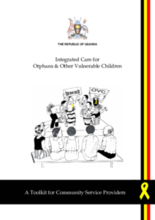The Government of Uganda is working through the Ministry of Gender, Labour and Social Development (MGLSD) to provide guidance on OVC programming. At the national level the National OVC Policy (NOP) defines the framework for OVC assistance, while the National Strategic Programme Plan of Interventions (NSPPI) provides guidelines for OVC programmes.
Although, many groups and organizations at the grassroots level in Uganda have found innovative ways to support orphans and other vulnerable children (OVC), they still have limited knowledge of the guiding principles and core programme areas recommended in the NSPPI. The Toolkit is a practical “how to” guide for selected OVC planning and support activities described in the MGLSD’s Integrated Care for Orphans and Other Vulnerable Children: Training Manual for Community Service Providers. It provides an overview of the OVC situation in Uganda, OVC guidelines and the role of community service providers. It also provides step-by-step guides, sample documents, needs assessment checklists, monitoring and evaluation indicators, programme models, behaviour change messages, and suggestions for further resources for community action planning, implementation of OVC programmes and training in OVC programmes.
The Toolkit is designed for OVC service providers at the community level, including community-based organisations (CBO), faith-based organisations (FBO) and non-governmental organisations (NGO). It can also be used by people providing technical assistance and support to these organisations, such as district Community Development Officers (CDO) or Probation and Social Welfare Officers (PSWO).
OVC service providers can use the Toolkit to improve existing OVC services; plan new activities; work more effectively with communities, volunteers and OVC; monitor and evaluate their OVC services; and learn about and apply the National OVC Policy that guide OVC programmes around the country.
©Uganda Ministry of Gender, Labour and Social Development

